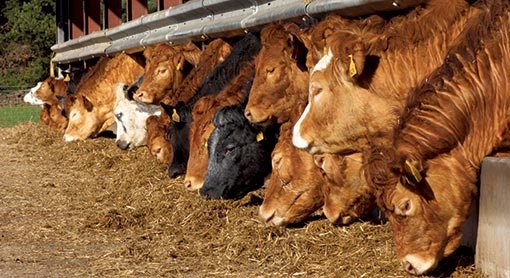How cheap cereals can reduce beef finishing times

Beef finishers feeding mixed rations should take advantage of cheap cereals to reduce finishing times, thereby increasing the throughput of store cattle.
However, nutritionists warn that maintaining good rumen health is crucial for good feed conversion.
Silage quality is poorer this year, with metabolisable energy levels averaging 10.5MJ/kg for first-cut, which is lower than the usual 11MJ/kg, says south-west consultant Pete Kelly of Kelly Consulting.
“More cereals will, therefore, be needed in rations to make up this energy shortfall from grass silage.”
However, with the cost of cereals down at about £100/t, he believes some finishers can go further and get animals away quicker.
“I see farmers finishing animals with 3-4kg a head a day of cereals fed with grass silage. But they could increase this to 7-8kg of cereals and decrease the finishing period.
“Once animals have developed the right frame size, cereals will give high growth rates.
“At the top end is barley beef with virtually 100% cereals fed and you can see growth rates of 1.6-2kg/day with continental breeds.”
He calculates that going part of the way by increasing liveweight gains by 0.4kg/day to 1.4kg/day when fattening from 500kg to 600kg, farmers can save four weeks.
Acidosis risk
However, processing is essential to get the most out of the cereal. When processing cereals, the grains only need cracking, as overmilling can result in acidosis.
The best way to “take the edge off acidity” in diets is to add 100g a head of limestone flour to buffer the rumen, says Mr Kelly. He uses this approach when feeding high levels of cereals to beef cattle.
KWS nutritionist Michael Marsden advises that farmers ensure the concentrate portion has sufficient digestible fibre.
“Don’t get too carried away – too much concentrate and you will see a reduction in rumen performance. Farmers need to guard against this and look at the bigger picture.”
He says 10-15% of the concentrate should be digestible fibre to help rumen function. Sugar beet is a good source and research at Harper Adams found that it led to optimised carcass weight and killing out percentages.
Also include a mix of cereals, giving a range of fermentation rates.
SRUC beef specialist Jimmy Hyslop advises a stepped approach, introducing ration changes gradually over a three-week period.
“If you go to a high level, build up gradually to let the rumen adjust.”
Mr Kelly acknowledges that increasing cereals does not suit all systems. “Organic farmers can’t feed any more than 40% of the total diet as concentrate, which equates to about 5kg/day for organic finishing rations.”
What feed?
“In the South West, wheat is at £100/t, oats are a bit less and barley is at £95/t,” says Mr Kelly.
Independent beef consultant David Hendy adds there are other various other cost-effective high energy feeds available this season including bread, various biscuit and breakfast meals and other by-products like potatoes and beet.
All these feeds have followed cereal prices downward, but care must be taken when including these to balance rations with appropriate forages (fibre) and proteins.
“Its much more of a buyers market this season,” he says.
It is essential to get the processing of cereals right , as overprocessing grains increases the risk of acidosis.
See also: Electronic ID results in £28,000 increase in beef income
